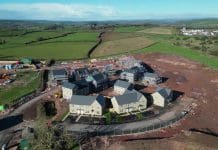Hearings for the second phase of the Grenfell Inquiry are unlikely to start before the end of next year, according to its chairman
Sir Martin Moore-Bick said the scope and complexity of the evidence that needs to be gathered and considers means it will be many months before the next stage can get underway – but once it starts, it should be completed “within a reasonable time”.
Phase One of the inquiry sought to establish in detail what happened at Grenfell Tower on 14 June. Phase Two will focus on the “critical circumstances and decisions which enabled such a devastating event to occur”.
“We need to understand in some detail the course of events, so that in Phase Two we can ask the right questions of the right people. In the course of doing that, we may also be able to confirm or dispel some of the rumours and suspicions which have surrounded the events of that night,” Sir Martin said in his closing remarks of Phase One.
There are currently 598 core participants in the inquiry, including 568 individuals, 10 government bodies or institutions and 20 commercial entities. The inquiry team has dealt with 20,000 documents, not including witness statements.
Phase Two, which will examine in detail the design and execution of a building project that took over four years to complete, is expected to involve the disclosure of over 200,000 documents to the core participants. This process is not expected to be completed until next autumn.
In addition, the inquiry will obtain witness statements from all those involved, in particular those closely involved in the refurbishment of the tower, which involved the installation of cladding containing flammable insulation material.
It is also likely that as the inquiry’s lawyers examine the documents, they will identify new questions for potential witnesses.
“I think it is unlikely that it will be possible to start Phase Two hearings before the end of next year,” Sir Martin said.
“However, careful and detailed preparation, which enables us to focus on the aspects of the project that are of real significance, should make it possible to ensure that the hearings, once begun, can be completed within a reasonable time.”
Sir Martin said he would consider making some recommendations in light of the findings of Phase One but will canvass the views of experts with relevant experience before doing so “in order to avoid unintended consequences of an undesirable kind”.

















